The global personalized nutrition market is valued at USD 3.5 billion in 2025 and is slated to reach USD 5.3 billion by 2035, reflecting a CAGR of 4.1%. Factors contributing to this growth include rising demand for customized supplements targeting chronic diseases, increased adoption of precision nutrition technologies, and growing awareness regarding preventive health.
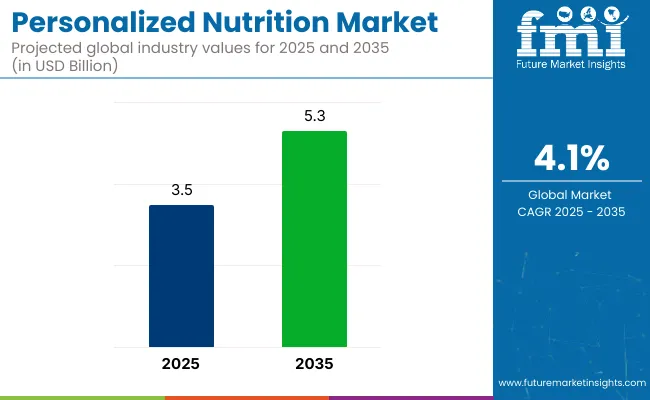
| Metric | Value |
|---|---|
| Market Value (2025) | USD 3.5 billion |
| Market Value (2035) | USD 5.3 billion |
| CAGR (2025 to 2035) | 4.1% |
Additionally, market expansion is being driven by collaborations between manufacturers and wellness centers to directly reach health-conscious consumers.
In 2025, the USA is projected to grow at a CAGR of 3.1%, while Germany and Japan are expected to expand at 4.2% and 5.6%, respectively, driven by rising health awareness, precision nutrition adoption, and ageing populations. Active measurement is projected to dominate the measurement method segment with a 62% market share in 2025. Personalized supplements are expected to lead the product type category with a 54.3% market share in 2025, driven by rising consumer demand for tailored supplements addressing chronic health conditions and preventive wellness.
Government regulations are advancing personalized nutrition by supporting research and development initiatives globally. In the United States, the FDA is formulating guidelines to ensure the safety and efficacy of personalized supplements and nutraceuticals. Additionally, the European Union has implemented stringent labelling and health claim regulations to enhance consumer trust. These regulatory frameworks are aimed at ensuring quality, transparency, and scientific backing for customized nutrition solutions in respective markets.
The market holds a relatively small but growing percentage within its parent markets. In the global nutraceuticals market, personalized nutrition contributes under 1%, reflecting its emerging status. Within the dietary supplements market, valued at approximately USD 170 billion globally, personalized nutrition forms around 2% to 3%, driven by rising demand for tailored supplements.
In the broader food and beverage market, which exceeds USD 6 trillion globally, its share remains minimal. However, rapid growth is expected as health-conscious consumers increasingly seek customized solutions, pushing its significance within these larger parent markets.
The market segments include product type, measurement method, sales channel, and region. The product type segment covers personalized supplements, personalized diet plans, personalized beverages, and disease-based supplements. The measurement method segment comprises active measurement and standard measurement.
The sales channel segment includes direct-to-consumer delivery services, wellness and fitness centers, hospitals and clinics, pharmacies, online, and retail stores. The regional segment includes North America, Latin America, Western Europe, Eastern Europe, South Asia and Pacific, East Asia, and Middle East, and Africa.
The personalized supplements segment is expected to remain the most lucrative within the product type category, holding a dominant market share of 54.3% in 2025.
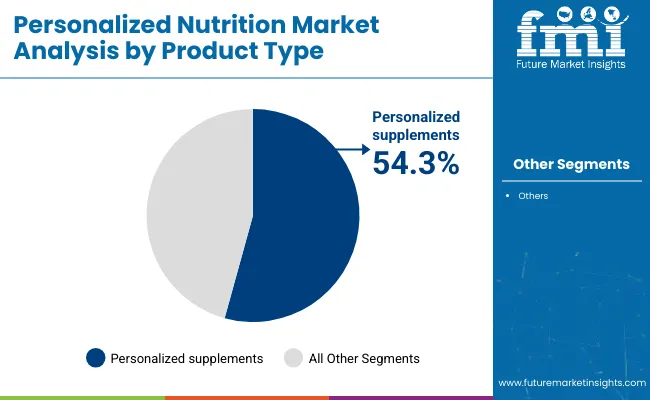
The active measurement segment is regarded as the most lucrative under the measurement method category, holding a market share of 62% in 2025.
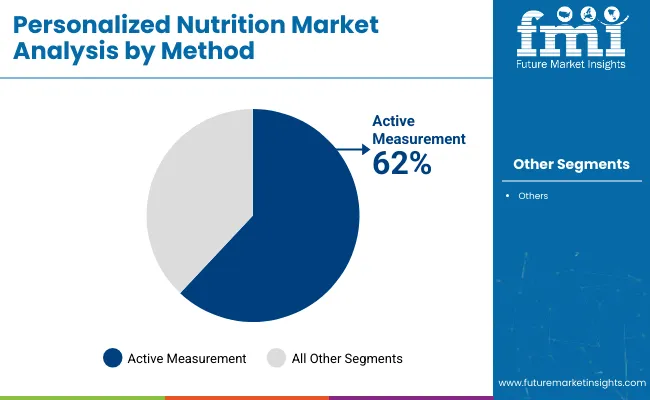
The wellness and fitness centers segment is considered the most lucrative within the sales channel category, holding a market share of 29.8% in 2025.
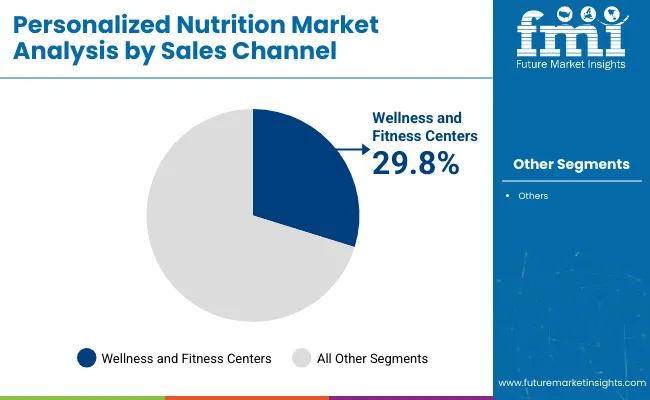
The global market is growing steadily, driven by rising consumer demand for tailored health solutions, increasing prevalence of chronic diseases, and advancements in precision nutrition technologies, including DNA-based assessments and AI-integrated dietary recommendations.
Recent Trends in the Personalized Nutrition Market
Challenges in the Personalized Nutrition Market
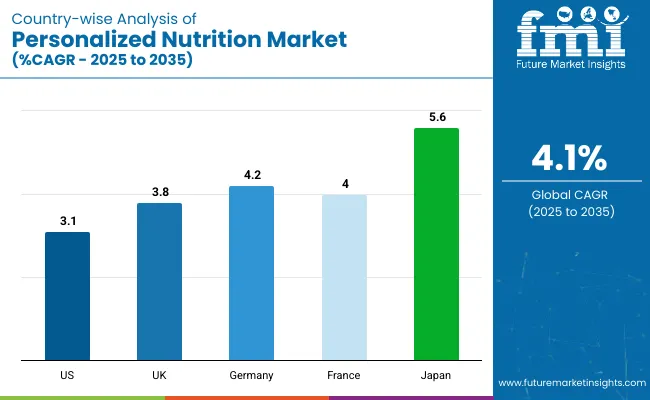
Japan is projected to lead the personalized nutrition market among these countries, growing at the highest CAGR of 5.6% from 2025 to 2035, driven by its ageing population and focus on healthy ageing solutions. Germany and France follow with steady growth rates of 4.2% and 4.0%, respectively, supported by health data integration, innovation, and strong regulatory frameworks.
The USA market is expanding at a moderate 3.1% CAGR, driven by demand among senior citizens and digital-savvy consumers. The UK shows stable growth, with its CAGR of 3.8% expected to align closely with France’s, supported by AI-based nutrition startups and rising consumer awareness.
The report covers an in-depth analysis of 40+ countries; five top-performing OECD countries are highlighted below.
The USA personalized nutrition market is projected to grow at a CAGR of 3.1% from 2025 to 2035. Growth is being driven by rising demand for precision nutrition solutions among senior citizens and digital-savvy populations like millennials and Gen Z.
Sales of personalized nutrition products in the UK are expected to expand at a steady CAGR of 3.8% over the forecast period.
Germany’s personalized nutrition products revenue is poised to grow at a CAGR of 4.2% during 2025 to 2035. The market is witnessing growth due to rising consumer use of health monitoring apps and the presence of innovative companies like MyMuesli offering DNA-based personalised cereals.
Sales of personalized nutrition in France are expected to expand at a CAGR of 4.0% steadily over the forecast period. The growth is driven by increasing awareness of health and wellness, a rising elderly population demanding disease-specific nutrition, and advancements in personalised supplement offerings.
Japan’s personalized nutrition revenue is projected to grow at a CAGR of 5.6% from 2025 to 2035. The market is driven by a rapidly ageing population, increasing focus on healthy ageing, and consumer preference for personalised supplements and beverages tailored to individual nutritional needs.
The market is moderately fragmented, with leading global players and emerging startups competing through innovation, partnerships, and targeted expansion strategies. Major companies like Nestlé S.A., BASF SE, and DSM dominate due to their extensive R&D capabilities and established nutraceutical portfolios.
Top companies in this market are competing by investing in AI-driven precision nutrition platforms, DNA and biomarker testing services, and strategic acquisitions to expand product offerings. Pricing strategies are tailored based on premium personalized supplement formulations and subscription-based diet planning models. Partnerships with fitness centers, biotech firms, and digital health platforms are being leveraged to enhance direct consumer access and build long-term brand loyalty.
Recent Personalized Nutrition Industry News
| Report Attributes | Details |
|---|---|
| Current Total Market Size (2025) | USD 3.5 billion |
| Projected Market Size (2035) | USD 5.3 billion |
| CAGR (2025 to 2035) | 4.1% |
| Base Year for Estimation | 2024 |
| Historical Period | 2020 to 2024 |
| Projections Period | 2025 to 2035 |
| Market Analysis Parameters | Revenue in USD billions/Volume (Metric Tons) |
| By Product Type | Personalized Supplements, Personalized Diet Plans, Personalized Beverages, Disease Based |
| By Measurement Method | Active Measurement, Standard Measurement |
| By Sales Channel | Direct to Consumer Delivery Services, Wellness and Fitness Centers, Hospitals & Clinics, Pharmacies, Online, Retail Stores |
| Regions Covered | North America, Latin America, Western Europe, Eastern Europe, East Asia, South Asia & Pacific, Middle East & Africa |
| Countries Covered | United States, Canada, United Kingdom, Germany, France, China, Japan, South Korea, Brazil, Australia |
| Key Players | Nestlé S.A., BASF SE, Care/of, DNAFit, mymuesli AG, General Mills, Inc., Nutrigenomix Inc., Telomere Diagnostics, Inc., Habit Food Personalized, LLC. |
| Additional Attributes | Dollar sales by value, market share analysis by region, and country-wise analysis |
The market size is USD 3.5 billion in 2025.
The market is projected to reach USD 5.3 billion by 2035.
The market is poised to grow at a CAGR of 4.1% during 2025 to 2035.
Personalized supplements lead with a 54.3% market share in 2025.
Wellness and fitness centers hold the largest market share with 29.8% in 2025.






Our Research Products

The "Full Research Suite" delivers actionable market intel, deep dives on markets or technologies, so clients act faster, cut risk, and unlock growth.

The Leaderboard benchmarks and ranks top vendors, classifying them as Established Leaders, Leading Challengers, or Disruptors & Challengers.

Locates where complements amplify value and substitutes erode it, forecasting net impact by horizon

We deliver granular, decision-grade intel: market sizing, 5-year forecasts, pricing, adoption, usage, revenue, and operational KPIs—plus competitor tracking, regulation, and value chains—across 60 countries broadly.

Spot the shifts before they hit your P&L. We track inflection points, adoption curves, pricing moves, and ecosystem plays to show where demand is heading, why it is changing, and what to do next across high-growth markets and disruptive tech

Real-time reads of user behavior. We track shifting priorities, perceptions of today’s and next-gen services, and provider experience, then pace how fast tech moves from trial to adoption, blending buyer, consumer, and channel inputs with social signals (#WhySwitch, #UX).

Partner with our analyst team to build a custom report designed around your business priorities. From analysing market trends to assessing competitors or crafting bespoke datasets, we tailor insights to your needs.
Supplier Intelligence
Discovery & Profiling
Capacity & Footprint
Performance & Risk
Compliance & Governance
Commercial Readiness
Who Supplies Whom
Scorecards & Shortlists
Playbooks & Docs
Category Intelligence
Definition & Scope
Demand & Use Cases
Cost Drivers
Market Structure
Supply Chain Map
Trade & Policy
Operating Norms
Deliverables
Buyer Intelligence
Account Basics
Spend & Scope
Procurement Model
Vendor Requirements
Terms & Policies
Entry Strategy
Pain Points & Triggers
Outputs
Pricing Analysis
Benchmarks
Trends
Should-Cost
Indexation
Landed Cost
Commercial Terms
Deliverables
Brand Analysis
Positioning & Value Prop
Share & Presence
Customer Evidence
Go-to-Market
Digital & Reputation
Compliance & Trust
KPIs & Gaps
Outputs
Full Research Suite comprises of:
Market outlook & trends analysis
Interviews & case studies
Strategic recommendations
Vendor profiles & capabilities analysis
5-year forecasts
8 regions and 60+ country-level data splits
Market segment data splits
12 months of continuous data updates
DELIVERED AS:
PDF EXCEL ONLINE
Personalized Immunotherapy Market Size and Share Forecast Outlook 2025 to 2035
Personalized Packaging Market Size and Share Forecast Outlook 2025 to 2035
Personalized Toys Market Size and Share Forecast Outlook 2025 to 2035
Personalized Beauty Devices Market Trends - Growth & Forecast 2025 to 2035
Personalized Bakery Products Market Analysis by Product Type, Price Range, Sales Channel, End-User and Region 2025 to 2035
Personalized Medicine Market is segmented by Personalized Medicine Diagnostics, Medicine Therapeutics, and Medical Care from 2025 to 2035
Personalized Home Decor Market Insights & Forecast 2024-2034
Personalized Skincare Serum Market Trends – Demand & Forecast 2024-2034
Personalized Orthopaedic Implant Market
Hyper-Personalized Fitness Market Insights & Forecast 2025-2035
3D-Printed Personalized Masks Market Size and Share Forecast Outlook 2025 to 2035
Nutritional Bars Market Size and Share Forecast Outlook 2025 to 2035
Nutritional Yeast Market Size, Growth, and Forecast for 2025 to 2035
Nutritional Labelling Market Trends and Forecast 2025 to 2035
Nutritional Ingredients in Animal Feed Market Trends - Growth & Industry Forecast 2025 to 2035
Nutritional Lipids Market
Nutrition Therapy Market
Fish Nutrition Market Size, Growth, and Forecast for 2025 to 2035
GLP-1 Nutritional Support Market Analysis - Size, Share, and Forecast Outlook 2025 to 2035
Multi Nutritional Supplement Market Analysis - Size, Share, and Forecast Outlook 2025 to 2035

Thank you!
You will receive an email from our Business Development Manager. Please be sure to check your SPAM/JUNK folder too.
Chat With
MaRIA